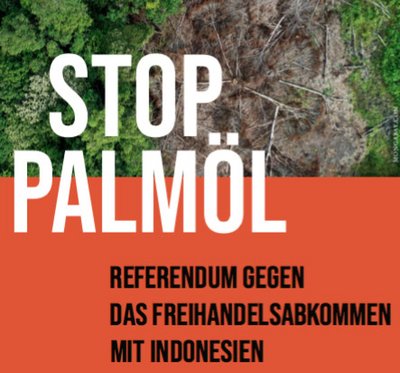Stop palm oil!
Referendum against a free trade agreement with Indonesia
by Claudia Meier, farmer and kindergarten teacher

As a member of EFTA, Switzerland has opened another chapter in the direction of globalised agricultural free trade. On 20 December 2019, the Swiss Parliament adopted a comprehensive economic partnership agreement between Switzerland and Indonesia. The announcement was published in the Bundesblatt on 31 December. The referendum has been started and supported by several groups and is running until 9 April. With the “Stop Palm Oil” referendum and organic winemaker Willy Cretegny from Satigny GE, as the initiator, resistance was building up immediately. At the press conference in Bern on 27 January, Cretegny put forward the following motives for this: “A free trade agreement [with Indonesia] means the expansion of palm oil monocultures, the destruction of the rainforest, child and forced labour, the use of highly toxic pesticides and the displacement of Indonesian smallholders and indigenous people.” Free trade policy exposes local production to unfair competition, both in Indonesia and in Switzerland. In addition, according to Cretegny, global warming also requires us to give up free trade in favour of a trade policy that favours local products. Michelle Reichelt of “Climate Strike Switzerland” adds that, with a free trade agreement, Switzerland would be jointly responsible for the suffering of the Indonesian population and the overexploitation of nature as a result of the cultivation of palm oil.
Do not endanger domestic oilseed production any further
Moreover, importing large quantities of palm oil at low prices would once again expose Swiss farmers to unnecessary price pressure. Rudi Berli, union secretary at Uniterre, is convinced that the free trade agreement with Indonesia would further endanger domestic oilseed production. Switzerland has a self-sufficiency rate of 35% for oilseeds. It is ecologically and economically sensible to maintain this level of production, says Berli. The agreement does contain a protective clause that could be activated in the event of an imbalance in the market: “Unfortunately, experience with the import of bread cereals and wine shows that such protective clauses are never applied.” Berli also points out that the aim of the food industry is to make all raw materials freely available, if necessary, at the lowest possible prices. “This has fatal consequences for people and the environment,” says the vegetable farmer from Geneva. Palm oil is the second-most imported oil and has increasingly displaced domestic oil production in recent years. “Ecologically and socially, palm oil is absolutely a disaster,” says Berli. In addition, Switzerland already has trade relations with Indonesia today and therefore does not need the planned agreement. Within these relationships, we can, or rather, urgently have to require from Indonesia the necessary sustainability criteria for the import of palm oil into Switzerland, insofar as the demand cannot be met by domestic vegetable oil.
The agreement serves primarily the shareholders of multinationals
Amanda Ioset, General Secretary of the Solidarité sans frontières organisation, comments as follows in the magazine -Schweizer Bauer (Swiss Farmer), “Free trade will not increase prosperity and quality of life in either Indonesia or Switzerland. It only serves the interests of the shareholders of multinational corporations.”1
At the end of the press conference, Willy Cretegny stated, “We are not against trading, but we want both trading partners, both sides of a trade, to be winners.” That is not the case with this agreement. In addition, the referendum must send the clearest possible signal for the upcoming discussions on the Mercosur free trade agreement.
So far, the referendum has been supported by: Uniterre, Multiwatch, Incomindios, Agrisodu, Grassrooted, Agrarinfo, Partei der Arbeit,, SolidaritéS, Nouveau Radical, Bioforum, Longo Maï, Solidarité sans frontières, Juso, Tier im Fokus, Kleinbauern-Vereinigung (Smallholder Association).
There is time until 9 April 2020, for us to submit the required 50,000 certified signatures. Signature sheets can be downloaded and printed out under the following link: uniterre.ch/de/themen/referendum-gegen-das-freihandelsabkommen-mit-indonesien •
1 Tschannen, Anja. «Palmöl ist eine Katastrophe. Referendum gegen den Freihandel mit Palmöl lanciert» (Palm oil is a catastrophe. Referendum launched against free trade with palm oil), in: Schweizer Bauer (Swiss Farmer) from 29 January 2020
(Translation Current Concerns)
Swiss Greens sympathise with the referendum
Statement of the Greens member of the Council of States and organic farmer Maya Graf
Current Concerns: I read with great interest about the referendum against a free trade agreement with Indonesia, which was launched by organic winemaker Willy Cretegny and a number of other organisations in January. Is the Green Party also campaigning for the referendum to come about? (After all, global free trade without effective sustainability standards and even more so free trade in agriculture are diametrically opposed to the concerns of green climate and agricultural policy).
Maya Graf: Uniterre took the referendum and asked the cantonal parties of the Greens. Some cantonal Green sections in French-speaking Switzerland have joined and are also collecting. And surely the Greens are also collecting signatures in all cantons.
If the referendum comes about, the Assembly of Delegates of the Greens Switzerland will certainly support the referendum, i.e. say no to this free trade agreement with Indonesia, which wants to bring duty free palm oil onto the Swiss market and only with sustainability criteria that are difficult to monitor. The protection of the rainforest and the land of small farmers is not fully guaranteed. With these arguments, we in Parliament have not approved the free trade agreement.
(Translation Current Concerns)